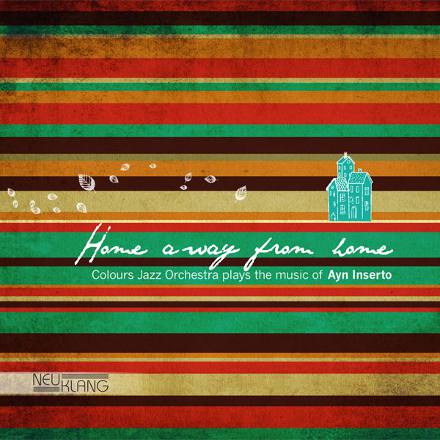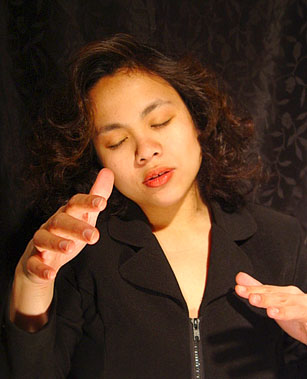"Home Away From Home" (Neuklang Records) is her 3rd recording, her first since 2009's "Muse" and also her first with an ensemble other than her own Orchestra. This time around, she's working with the Colours Jazz Orchestra, the brainchild of trombonist Massimo Morganti (whom the composer met at NEC). He invited her to Italy where she met his ensemble (in existence since 2002) and she knew she wanted ti work with them. Ms. Inserto composed 5 of the 7 tracks, including a smart rearrangement of Joe Henderson's "Recorda Me" and the splendid closer "Subo", a mambo from the pen of Boston-based trumpeter Dan Rosenthal (a member of Ms. Inserto's Jazz Orchestra). One cannot help but hear the influence of Mr. Brookmeyer on the playful opening track, "You're Leaving? But I Just Got Here" with swirling interlocking solos and the long chords in the background, all taking place over a rousing beat. It's also evident in the lovely ballad "La Danza Infinita" in the way the various sections move in an out of the mix plus how Morganti's trombone solo does not occur until halfway through the piece, growing logically from what came before. The slinky, soulful, "Down A Rabbit Hole" opens with a frantic brass and reeds scramble before dropping into a funky rhythm - the song also includes a blazing hot tenor solo from Fillippo Sebastianelli. Watch out for the really funky (think Average White Band funky) "Hang Around", driven by the "fatback" drumming of Massimo Manzi - he even gets a short high-energy solo near the close of the track.
"Home Away From Home" is a welcome addition to the discography of Ayn Inserto. Her compositions continues to mature and her arrangements have a sparkle that make them stand out from many of her contemporaries. Another impressive aspect of this music is how the emotional content comes through, even though the Colours Jazz Orchestra is not her main vehicle. The composer, who also serves as the conductor here, is able to get musicians who are not as familiar with her as the ones she has worked with for the past decade, to illuminate her intentions and emotions.
For more information, go to www.ayninserto.com.
Trombonist/composer John Yao, born and raised in Illinois, did his undergraduate work at Indiana University then earned a Master's Degree in Jazz Performance from the Aaron Copland School of Music at Queens College in New York City. He has worked with a slew of artists ranging from the Vanguard Jazz Orchestra, Arturo O'Farrill's Latin Jazz Orchestra, The Glenn Miller Orchestra and is a member of the salsa band, Chino Nunez and Friends.
His debut CD as a leader was "In the Now", a Quintet date released by Innova Recordings in 2012. Now, he has issued "Flip-Flop", subtitled "John Yao and His 17-Piece Instrument" on his See Tao Recordings. One will recognize many of the names in the ensemble, including Jon Irabagon (tenor saxophone, clarinet), Rich Perry (tenor sax), David Smith (trumpet, flugelhorn), Luis Bonilla (trombone), Jesse Stacken (piano) and Vince Cherico (drummer). Co-produced by Yao and JC Sanford (who has his own impressive large ensemble), the program kicks off (literally and figuratively) with the title track. It may remind some of the Mel Lewis Jazz Orchestra in its sweep and in how the the soloists moves easily in and out of the track. Cherico is the perfect drummer for this music in that he can be explosive or tender when called but, more important, is always right on the beat and locked in with bassist Bob Sabin. Notice their support of the soloists throughout the album but especially on the medium-tempo "Reflection." "Ode to the Last Twinkie" may sound like the title of a Frank Zappa and there are some Zappa-esque flourishes plus a hyperactive closing section during which Irabagon, John O'Gallagher (alto sax), Andy Gravish (trumpet), and Matt McDonald (trombone) catch fire over the sections. The "call-and-response" right before the close is dazzling.
One needs to take his or her time with large ensemble. There is so much to listen, so many moving parts, and, often, so many impressive solos. Such is the case with "Flip-Flop". One wants to go back and take time with all the tracks, even the 2 shorter "Soundscapes." "No. 1" is a smattering of sounds, legato rhythm, swirling horns and cymbals yet never threatening. Rich Perry gets the lead on "No. 2", a piece with more forward motion but with moaning sounds from the reeds brass while Cherico moves around his kit with abandon.
By the time you reach the final track, the straight-ahead swinging "Out of Socket", one realizes he's been on quite a journey. The composer may not be telling stories in the fashion of Maria Schneider or Bob Brookmeyer but that should come in time and experience; at this time, his intention is making music that involves the musicians, giving them a variety of avenues to display their talents The album clocks in at 78 minutes with 6 of the tracks over 8 minutes. That's a lot to take in but it's worth the time. John Yao uses this "Instrument" to deliver great pleasure.
For more information, go to www.johnyao.com.
Todd Marcus, who plays bass clarinet and hails from Baltimore, MD (where he still lives), has a new recording with his nonet, the Todd Marcus Jazz Orchestra. "Blues For Tahrir" (HiPNOTIC Records) is a multi-layered project, reflecting the composer's family roots (his father was born in Egypt) and his non-profit work in the poorer areas of his home. Yes, this is music that has a message that can be construed as "dark"; after all, the title contains the word "blues" and we all know what has transpired since the 2011 "Arab Spring." It's also infused with hope and a desire to soothe, if not heal, the world with art.
The TMJO is a nonet that includes Greg Tardy (tenor saxophone), Russell Kirk (alto saxophone), Brent Birckhead (alto sax, flute), Alex Norris (trumpet), Alan Ferber (trombone), Xavier Davis (piano), Jeff Reed (bass), and Eric Kennedy (drums) plus guests Jon Seligman (percussion on 3 tracks) and Irene Jalenti (vocals on 3 tracks). The centerpiece is the 4-part, 24-minute title "Suite" yet the program opens with with "Many Moons (Intro)" and "Many Moons." These pieces posit Marcus's composing and arranging in the post 1960s, picking up hints of the work of McCoy Tyner and Herbie Hancock as well as younger composers such as Orrin Evans (Marcus has worked with the pianist's Captain Black Band). The quiet opening to "Alien" favors the reeds and brass with the leader's bass clarinet holding down the bottom. The ballad picks up speed when Ms. Jalenti's husky alto, with a touch of Melody Gardot in the delivery, gives the lyrics (the piece was composed by Marcus's friend Gary Young) an air of mystery. There's a splendid solo from Ferber (not surprising) and, after vocal verse, Davis steps out over the active rhythms of Reed and Kennedy. The vocalist returns for a fine Marcus arrangement of George Gershwin's oft-recorded "Summertime". Again, the group takes its time moving through the opening section before Ms. Jalenti enters; she also is no hurry the first time through but, suddenly, the band moves in a funky direction. The Northern African influence is heard on "Wahsouli", pointing to Tyner's mid-70s recording with larger ensembles. The sweep of the brass and the high tones of the flute also display a Randy Weston influence.
 |
| Add capGary Young imagetion |
"Blues for Tahrir", the second large ensemble recording for Todd Marcus (2012's "Inheritance" featured 2 different quartet dates) is not only powerful work of social consciousness but also a strong musical step forward for the composer/arranger. The future for Marcus's father's homeland is muddy at best but that will not stop the citizen of baltimore and the world from trying to heal the rifts that surround him and us all.
For more information, go to www.toddmarcusjazz.com.
There is a "pop" sensibility rife in the ensemble's program on its sophomore effort, simply titled "Zubatto Syndicate 2" (Boscology). One cannot miss it in the fiery take of Metallica's "Master of Puppets" and while the translation to large ensemble does not seem to be a parody, it's hard to match the energy of the original 1986 performance. Not that the Syndicate does not try. Boscardin's fuzzy guitar licks lurk in the background and there are "killer" solos from Ms. Fleener and and Marriot,Jr. The punk intro to "Thyonean Butt Rock" is even heavier (pun intended) and one has to chuckle in how the melody shifts from the clarinet to the bassoons and oboe. But, Boscardin is somewhat serious as well. His blazing guitar solo is delightfully excessive and DeJoie's baritone sax solo matches his intensity. More of the same intensity on "Iggy (Ignaceous Carapace)" but this time it's Ms. Fleener who kicks serious butt on her wild solo.
The majority of this music is fun to listen to, especially to hear where Boscardin will take his band. The program opens with "BBots" - the swirling synth opening, a la Parliament Funkadelic, gives way to melody and arrangement that would not sound out of place on "Thriller". Can't help but chuckle at the keyboard "bagpipe" solo has the sound of Traffic's "Low Spark of High Heeled Boys." "Gort's Big Day" displays a good dose of funk, much of which comes from the bass and drums. The bass clarinet solo, with its somewhat excessive echo, does "get down" and the final 2 minutes has a pleasing call-and-response in the reeds while the brass bumps along. The guitarist combines 3 pieces by Beyoncé into "The Zeyoncé Suite". Like the Metallica cover, one does not detect parody as much as the opportunity to play with the possibilities in the originals. When the oboe rises out of the mists of "Flawless" or the brass takes on the melody of "Pretty Hurts" or the trombone leads the way on "XO", there is an honesty that permeates the performances.
"Zubatto Syndicate 2" has its share of odd sounds (cheesy organ and synth riffs, flashy "shredded" guitar solos, and the delightful burbling bassoons) yet one can't help but smile and pump up the volume. Andrew Boscardin is serious about the possibilities of linking "popular" music to an improvising ensemble yet does not discount the fun, the "play", in his and the band's endeavors. Have fun with this recording!
For more information, go to www.boscology.com.
Enjoy "Gort's Big Day":











No comments:
Post a Comment